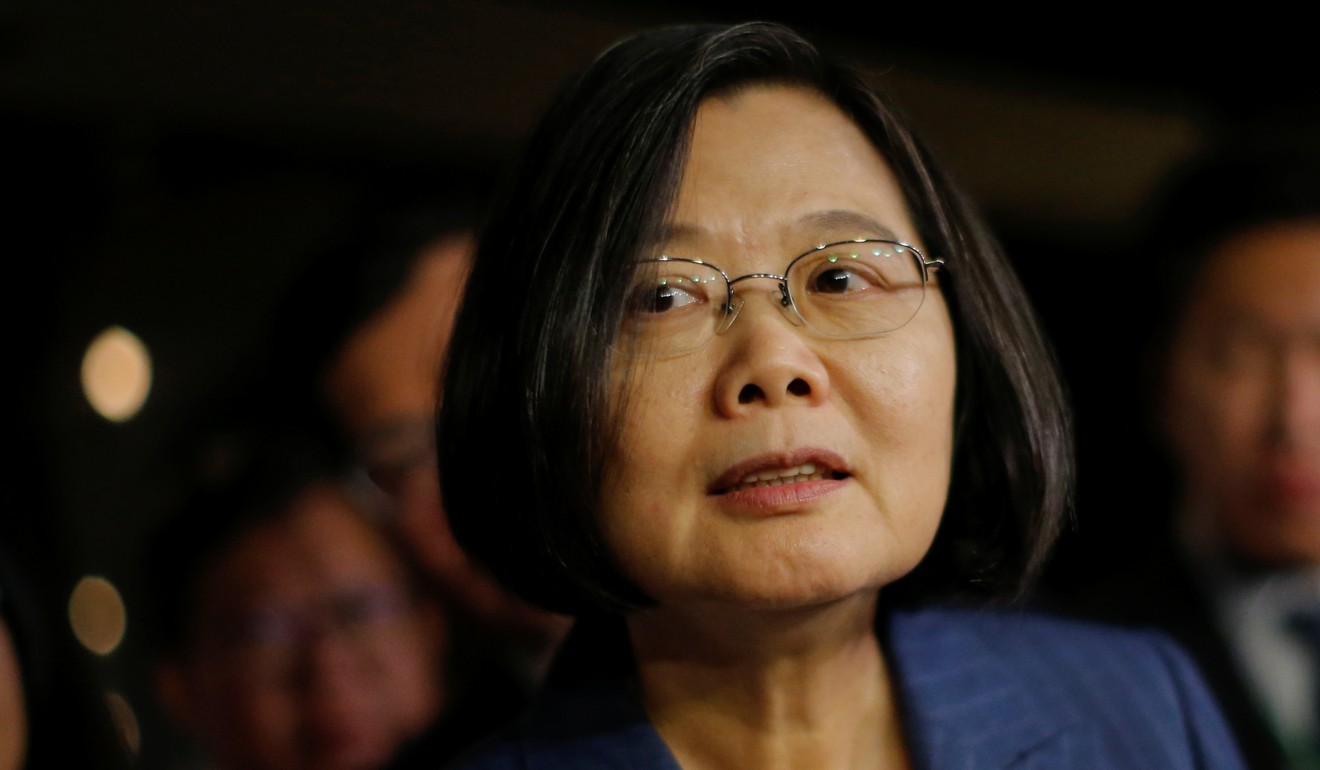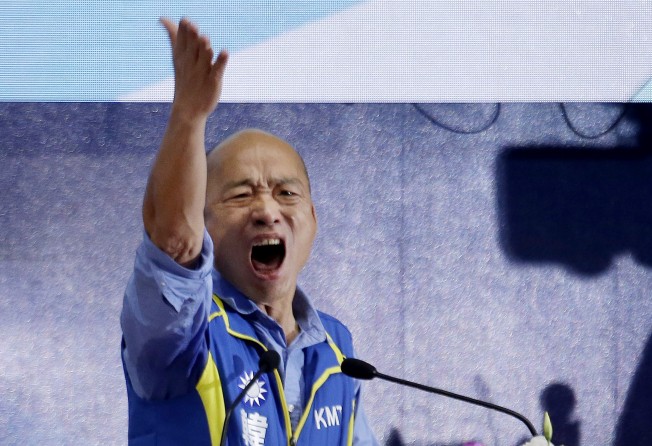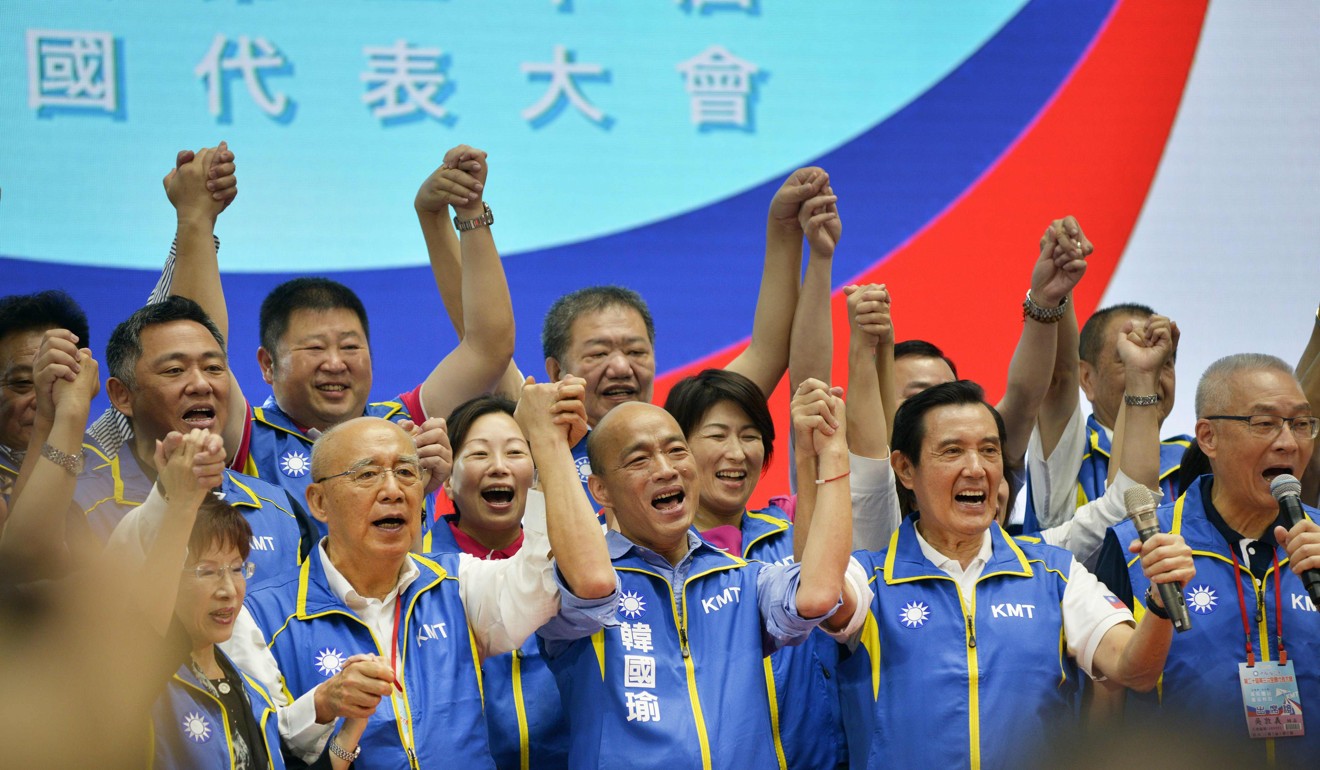
KMT presidential candidate Han Kuo-yu says 2020 election will be life-or-death battle for Taiwan
- Beijing-friendly populist mayor is officially nominated by the opposition Kuomintang to challenge Tsai Ing-wen in January
- He says poll will be a choice between peace or crisis across the strait

Taiwan’s upcoming election will be a life-or-death battle for the self-governing island and a choice between cross-strait peace or crisis, the opposition Kuomintang’s presidential candidate said.
Beijing-friendly Kaohsiung mayor Han Kuo-yu was officially nominated by the party on Sunday to challenge incumbent Tsai Ing-wen from the independence-leaning Democratic Progressive Party in the presidential poll in January – an election that will be closely watched by both Beijing and Washington amid their escalating rivalry.
Cross-strait relations, which have deteriorated since Tsai took power in 2016, are expected to figure prominently in the campaigning, according to analysts on both sides of the Taiwan Strait. Weeks of mass protests in Hong Kong over a controversial extradition bill – which have put Beijing’s promise of “one country, two systems” in the international spotlight and created a ripple effect in Taiwan – are also likely to be a key issue.
“This won’t be a polite gentleman’s race. The election is about the life and death of the Republic of China (ROC) and Taiwan’s next generation,” Han said, using the island’s official name in an emotional speech after his formal nomination during the KMT congress.
“The people will make a sacred choice for the fate of our country in the next four years. The election is a choice between a peaceful Taiwan Strait or a Taiwan Strait filled with crisis,” he said.

The 62-year-old blunt-speaking populist, who often describes himself as a “president for the common people”, also lashed out at Tsai’s domestic policies and blamed the ruling party’s anti-mainland approach for the downward spiral in the island’s relations with Beijing.
“We are going to create an economic miracle, in which Taiwan will be safe and its people will be rich. Let’s work hard for our next generation,” Han said.
His nomination was effectively decided earlier this month after he defeated four other KMT candidates, including Taiwan’s richest man, billionaire Foxconn tycoon Terry Gou, in a bitter and divisive primary race.
While most KMT heavyweights – including former president Ma Ying-jeou – attended Sunday’s gathering, Gou did not show up amid speculation that he may choose to run as an independent.
In a bid to rally support ahead of a difficult campaign, Han appealed to Taiwanese voters that the January poll should be a vote based on economic prosperity and stable cross-strait relations rather than the “colours” of the island’s political parties.

Yang Lixian, from the Research Centre for Relations Across the Taiwan Straits, founded by the mainland’s Taiwan Affairs Office, said Beijing would welcome Han’s nomination because of his support for closer exchanges and the “1992 consensus”.
The consensus is a tacit agreement between Beijing and Taiwan’s then KMT administration that there is “one China”, but each side can have its own interpretation of that.
“Han’s nomination showed that there’s a genuine sense of crisis within the KMT about the direction of Tsai’s mainland policy, which refuses to recognise that Taiwan is part of ‘one China’ and attempts to suppress different opinions that promote warmer ties with Beijing,” she said.
In a recent survey by Taiwan’s National Chengchi University’s Election Study Centre last month, nearly 60 per cent of the respondents identified themselves as Taiwanese, while 37 per cent said they were both Taiwanese and Chinese. Less than 4 per cent said they were Chinese.
“If Han is elected in January, cross-strait relations will be reset and see some steady improvement soon,” Yang said. “However, if Tsai is re-elected, she is likely to continue to rely on Washington, which sees Taipei as a useful card to contain China. Cross-strait ties would inevitably be plunged deeper into trouble, casting further uncertainties over Taiwan’s future.”
As Beijing ramps up international pressure on Tsai’s administration, US President Donald Trump has taken a series of Taiwan-friendly measures, including upgrading military and diplomatic exchanges and an agreement this month to sell arms worth US$2.2 billion to Taiwan.
Beijing condemned the arms sale decision, claiming Washington “severely violated the basic norms of international law and international relations”.
Tsai said in an interview with Japanese broadcaster NHK on Saturday that mainland China’s latest defence white paper released last week demonstrated Beijing’s continued military build-up, and Taiwan needed to respond by bolstering its defence capabilities.
She also reiterated her support for the mass protests in Hong Kong, adding that she hoped today’s Taiwan would be tomorrow’s Hong Kong – stressing the importance of the guarantees of democracy and freedom of expression, NHK reported. Tsai has said that she would consider offering asylum to protesters based on humanitarian principles.
Han, in contrast, visited Beijing’s liaison office in Hong Kong during a three-day economic trip to the city, Macau and Shenzhen, in March. He also said he had no idea about the protests when they first began in June.
Yang Lixian described the trip, during which Han secured several trade deals, as proof of Beijing’s support for the KMT candidate.
Andrew Yang Nien-dzu, a former Taiwanese defence minister, noted Han had made no mention of “one country, two systems” – a model Beijing has suggested could be used in Taiwan.
Beijing regards Taiwan as a renegade province to be reunited with the mainland, by force if necessary.
“Taiwan is confronting a crisis and Han did not go into detail about specific policy issues. But he stressed that he is the candidate who has friendly ties with the mainland, which could help avert a possible confrontation with China,” he said.
He did not see cross-strait relations deteriorating further before the election because Beijing would take a wait-and-see approach to avoid being accused of trying to meddle in Taiwan’s polls.
He also cautioned that pro-independence voters should not pin their hopes on the US, because for Washington, Taiwan was leverage to gain the advantage in its deal-making with Beijing. “The US understands China’s stance on Taiwan and is unlikely to cross the red line,” Andrew Yang said.